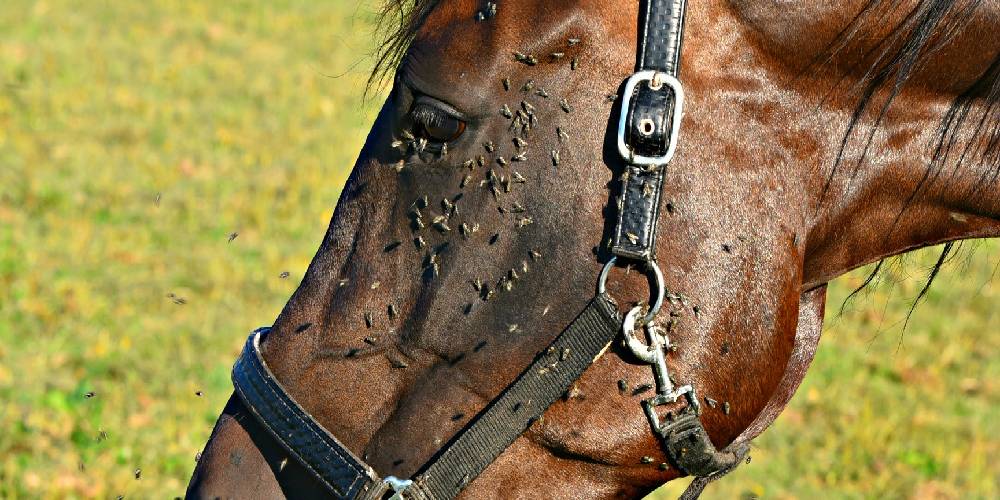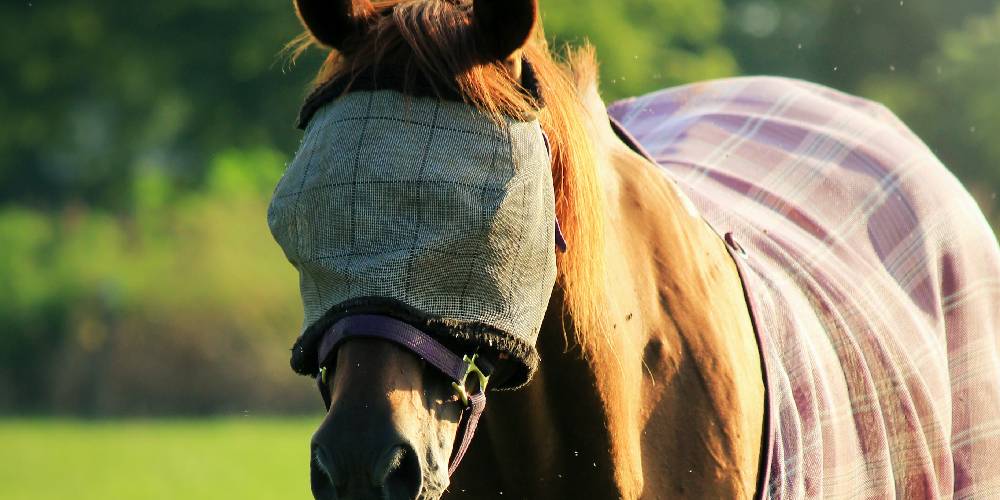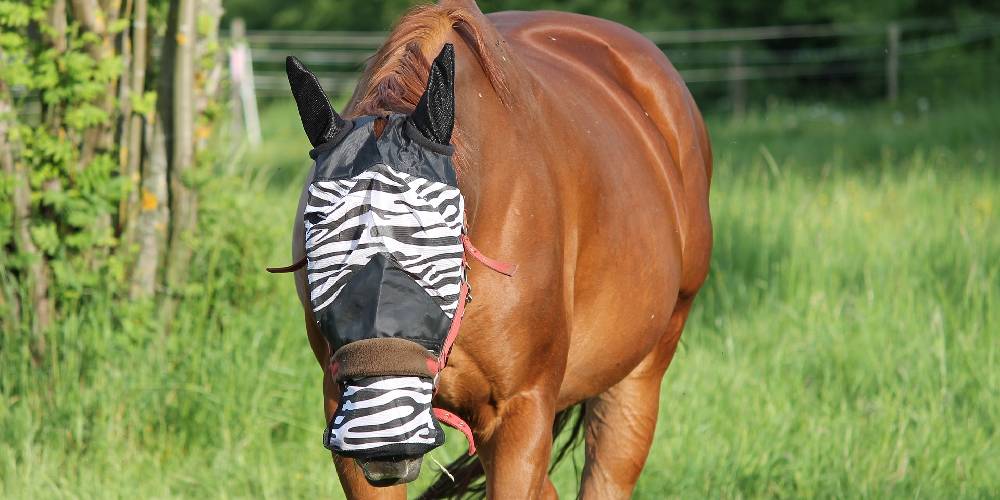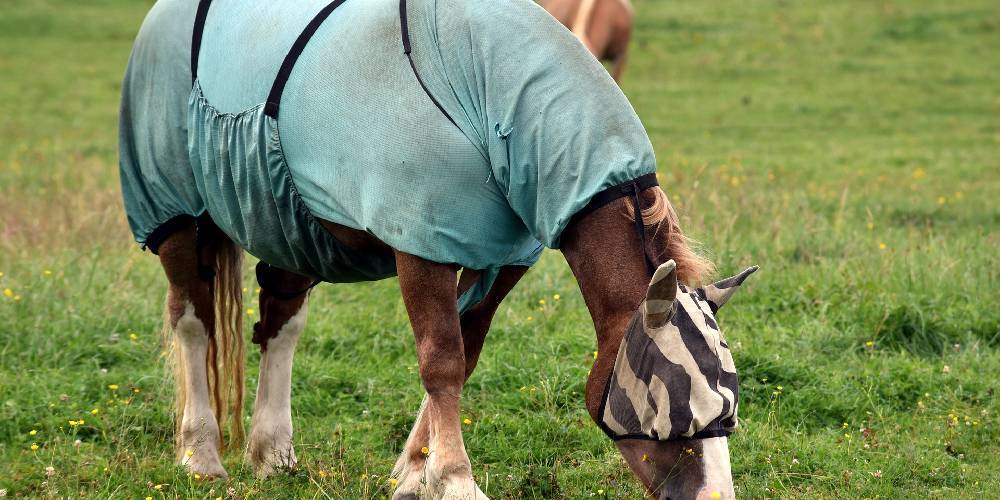Did you know that horses have allergies just like people do? Horses can actually be allergic to all kinds of things including anything from feed, to other animals, to even certain medications or sprays. But what if a horse was allergic to flies? Can this happen? Is it common? And what precautions would you need to take to help protect your horse from this unique allergy?
Can Horses Be Allergic To Flies?
Believe it or not, yes, horses can be allergic to flies. This is a really difficult allergy to deal with as flies seem to be a permanent staple in a horse’s life, especially during the summer months. Horses with this allergy should be protected from flies using fly sprays and other fly-repelling or protective gear. The most common reaction horses with this allergy will have would be the appearance of sores or hives all across their entire body. Horses with this allergy are actually more allergic to the fly’s bite rather than the insect itself. This is why having fly repellants and protective equipment is crucial to keep the flies from biting the horse.
Is This A Common Allergy?

A fly allergy isn’t really a super common allergy, but it isn’t unheard of either. I have known a couple of horses myself who are allergic to flies. Though most horses don’t have this allergy, some do and its common enough to be something to look out for.
What Are The Symptoms Of A Potential Fly Allergy?
There are many symptoms and ways to tell whether or not your horse has a fly allergy. Some of the common symptoms or reactions seen caused by this allergy are:
Hives
Just like in people, horses can get hives from an allergic reaction too. Often these hives will be anywhere from the size of a pea to the size of a quarter and will be raised and noticeable even from above the horse’s coat. The hives will most likely appear on the horse’s neck, flank, rump, and tail as these are the areas that a horse might find it hard to get the flies away.
Sores
Because these horses are allergic to flies, when a fly bites them, rather than an itchy bump appearing like a normal bug bite, a sore might develop. These sores, as you might know, will attract more flies to the area and soon sores may spread all across the horse’s body.
One of my friends had an old gelding named Jack who had a really bad fly allergy. Because of this, Jack would not only get the occasional breakout of hives, but the flies would leave sores all over his body in really uncomfortable places. One of the most uncomfortable places where Jack would get sores would be in his sheath.
Itchiness
Like any bug bite you might get, there is bound to be itchiness. This goes for flies as well. If a horse has a fly allergy though, the itch takes on a whole different level and it can get really irritating for the horse.
Swelling & Inflammation
Like with many allergies, one of the allergic reactions a horse might face when allergic to flies would be swelling and inflammation across the body. I remember seeing my friend’s horse Jack suffering from swollen eyes, random inflamed patches on his body, and even swelling in his sheath and on his penis.
Tail Or Mane Rubbing
Because of the increased itchiness that a fly allergy gives to horses, they are more likely to get what is known as a roached mane or a rat tail. This basically means that they will rub their mane and tail on things until the hair is rubbed away. This is just them trying to itch themselves but in many cases, it just results in a rough-looking mane or tail.
Cuts & Open Wounds
Whether it’s from sores from fly bites or cuts from trying to itch themselves on something too sharp, cuts and wounds are known to be quite prevalent in horses dealing with this allergy. Sometimes puss and other fluids can ooze out from these injuries and infection can be caused quite easily too.
Is This An Allergy That Is Developed Over Time?
Some horses show that they are allergic almost right away while others will show this allergy later. Like many allergies, a fly allergy in horses can develop over time if there is constant or frequent exposure.
What Precautions Should I Take To Protect My Horse With A Fly Allergy?

There are a few things that you can or should do to help keep your horse safe from flies. These things include:
- Use fly repellent spray
- Use anti-fly equipment
- Keep your horse in the shade (it’s more comfortable for them)
- Keep up on your horse’s sheath cleaning (if they are a male)
- Care for and clean any wounds, lesions, cuts, scrapes, rub marks, sores, or any open injuries
What Anti-Fly Equipment Should I Use?

There are so many fly protection options for horses right now that covering your horse and protection them from flies would not be too hard to accomplish. The things that I would personally recommend to anyone looking for fly protection equipment would include:
Fly Mask With Ear & Muzzle Protection
The face is one of the most sensitive to flies overall. This is mainly because of the fact that flies are attracted to the horse’s ears, eyes, nose, and mouth. Having a fly mast that covers all of these areas would help your horse to stay more comfortable and not have to deal with the pesky flies bothering its face.
Fly Sheet
Using a fly sheet is extremely helpful when it comes to keeping flies off of the horse’s body. You can even get fly sheets that have a big band that covers the horse’s stomach. Fly sheets with this stomach band protect not just the flank, barrel, hindquarters, and shoulders, but they also protect the stomach and chest from flies as well.
Fly Boots
Fly boots are really helpful pieces of equipment that can help to keep any flies off of the horse’s lower legs. My horse Cisco attracts flies to his legs like crazy so putting fly boots on really helped to make him more comfortable.
Fly Spray
Fly spray is a must! The nice thing about the fly spray is that it puts a smell on the horse that flies really hate. Sometimes, if you spray a fly with fly spray they could even die from it! Using fly spray is a must to make sure that fliesstay off of your horse for as long as possible.
I recommend spraying it in places on the horse’s body that could be affected by flies. If my horse is wearing all of this protective fly gear, I like to spray it on the sensitive areas that are still exposed such as the horse’s:
- sheath/penis
- muzzle (I spray it on my hand then wipe it on his muzzle so my horse doesn’t have a panic attack)
- Exposed leg
Fly Sheet Hood
Using a hood with your fly sheet helps to add that extra coverage from flies. This hood will cover the horse’s entire neck and keeps flies from irritating this entire area of the horse.

